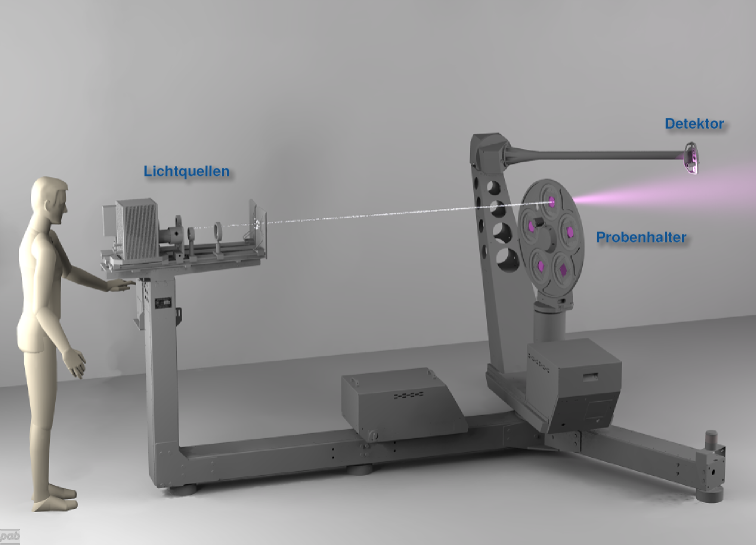pab Gonio-Photometer - BSDF, BRDF, BRTF measurement services
Measurement equipment
Our pgII gonio-photometer is an absolute, out-of-plane, spherical, scanning gonio-photometer generating
adaptively spaced, multi-wavelength data with medium to very high angular resolution (using the terms
defined in standard ASTM E1767).
For full details, please check our sister side pab advanced technologies Ltd.
Standard procedures
We offer measurements of angular dependant transmission/reflection of materials, known as
BSDF,
BRDF or
BRTF:
- measurements according to
ASTM E2387-05 Standard Practice for Goniometric Optical Scatter Measurements
,
ASTM E1767-04, DIN 19045-4,
and others
-
- light sources alternatives: Halogen, XBO Xenon, laser diodes 650nm and 532nm, HeNe Laser 632.8nm, other light sources upon request
- detector: Si measurement cell (standard d=10mm, alternatively d=1mm, distance 1m), InGaAs sensor with wavelength response up to 2.5um
- filters: IR-filter, IR-cutoff, bandpass, V(λ), depending on customer requirements
- sample sizes:
flat materials: minimal 10mm diameter, typical 80mm x 60mm, maximum 900mm x 1000m
thickness between 0.1mm and 200mm,
custom mounts for non-flat objects (prisms, gratings, etc) are available
- standard data format: ASCII text files
conversion to other formats according to the needs of your project
- data visualisation: 2D plot or mountain 3D view
- further data processing, simulation and consulting depending on project
Measurements out-of-plane
Using our sophisticated pgII gonio-photometer,
the detector path covers the full sphere around the sample centre. Only exceptions are the sample holder and the self-shadowing
of the detector. Both are minimised by the unique design of the pgII.
The standard angular resolution is approximately 0.2o along the detector path and 3o between the paths
(see mountain plot). These parameters are fully configurable to match the characteristics of the sample.
Typically, each dataset consists of around 120000 outgoing angles per incident angle.
The detector path covers the sphere with a pattern similar to patchwork (see orthogonal mountain plot).
If your application needs BSDF/BRDF at regular (ϑ, φ)-grid we supply interpolated data values.
Example of the reflection of sand-blasted glass:
Measurements out-of-plane plus adaptive subdivision
The detector path covers the full sphere plus finely resolved sampling of the reflective and transmissive peaks.
This is highly advisable for polished or translucent samples which show a pronounced peak in their BSDF/BRDF.
Holographic or micro-structured materials and their
Standard angular resolution is around 0.1o for the peaks and results in approximately. 30000 extra measurement samples of
the peaks.
Example of a translucent, woven sunscreen fabric:
Measurements in plane of scattering
Applications which require the BSDF only to be known in the plane of scattering allow for an optimisation of measurements, as the detector
path can be restricted to the plane of scattering. Thereby the detector moves around the sample on a horizontal spherical path
and remains in the plane defined by the sample normal and the incident direction.
We offer an improvement to this technique: By scanning some angular area above and below the plane of scattering our detector
measures peaks of BSDF even if they are slightly out-of-plane to do some non-ideal flat sample surface.
the standard angular resolution is 0.05o (3').
Example of an aluminium surface:
LED and light source measurements
LED light sources are measured with high angular resolution (better 0.1o) and result in precise
candle-power-distribution curves (see some LED examples from 2005).
Please contact us for details.
Contact
contact for measurements: email to pab-opto
more info on our gonio-photometer pgII II
web address of this page: http://www.pab-opto.de?d=/gonio-photometer/service
Datenschutzerklärung , Impressum
page contents © pab
all specifications have been compiled with care, but we reserve the right to updates.
Dr. Peter Apian-Bennewitz,
pab-opto







